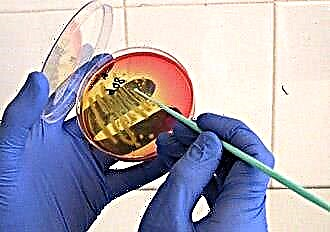Bleeding from the nose at least once in their life happened in about 2/3 of all people. That is, the overwhelming majority. Let's consider the mechanism of this trouble. The fact is that the mucous membrane lining the nasal cavity is very densely covered by a network of small vessels. Their role is to warm the air that enters the body through the nose to a normal body temperature (usually 36.6 ° C). In addition, they prevent the respiratory system from hypothermia. The capillaries are on the surface, so they can be damaged quite easily. That is why an adult's nose can bleed even with an ordinary rhinitis.
Main reasons
Frequent nosebleeds are serious symptoms. He should be especially alarming if nothing like this has happened before. However, it is generally found that it is just a functional disorder. In this case, there is nothing to worry about. However, if the blood in the nose began to appear constantly, it is imperative to consult with an otolaryngologist.
 There are several reasons that can trigger nosebleeds in adults. They do not speak about the development of any disease in the body. This is mainly the effect on the vessels located in the nose from the outside. So, let's look at what causes nosebleeds in most cases:
There are several reasons that can trigger nosebleeds in adults. They do not speak about the development of any disease in the body. This is mainly the effect on the vessels located in the nose from the outside. So, let's look at what causes nosebleeds in most cases:
- Overwork and stress. For some, these are familiar life companions that can be ignored. And for some it is the reason that the nose bleeds every day. Poor quality of life, frequent overwork and lack of vitamins lead to increased fragility and fragility of the vessel walls. When the capillaries break, blood flows from the nasal passages. In order to prevent this, it is necessary to adhere to a healthy lifestyle, observe the correct mode of work and rest, and also eat well.
- Overheating (heatstroke). People often do not understand how overheating and bleeding can be related. In fact, the relationship between these phenomena can be traced quite clearly. An increase in temperature provokes dehydration and dryness. The walls of blood vessels become thinner, so they break quite easily. And naturally they bleed.
- Injury to the nose. If the integrity of the vessels is compromised, frequent nosebleeds may occur. The more serious the injury, the more blood loss will be.
- Dry mucous membranes. It entails fragility of the capillaries and their increased fragility. The mucous membrane lining the inside of the nasal cavity can dry out as a result of prolonged stay in a room with dry air or in frost.
Diagnostics
To get an answer to the question of why nosebleeds often come, you need to seek help from an otolaryngologist. He will collect anamnesis, conduct a detailed  examination and, if necessary, appoint several examinations.
examination and, if necessary, appoint several examinations.
The doctor always examines with a rhinoscope. This is a small device that is used to widen the nasal passages. Use it to completely examine the mucous membrane. If the bleeding is severe enough, the doctor, before inserting the rhinoscope, sucks the blood along with the mucus using a special instrument. Then he very carefully inspects the bundles of blood vessels. During the examination, it is important not to touch the crusts of caked blood so as not to provoke new bleeding. It should be noted that the posterior chamber of both nasal passages is not visible through the rhinoscope. Therefore, the doctor, as a rule, is not limited to one rhinoscopy.
To make the most accurate diagnosis, the otolaryngologist can refer the patient who comes to him for angiography of the vessels of the carotid artery, as well as for x-ray of the nasal sinuses. True, the last examination does not make it possible to determine the source of bleeding. It is most often performed if there is a suspicion of any neoplasm.
If a patient complains of frequent nosebleeds, anemia (a decrease in the number of hemoglobin, platelets and red blood cells) can be seen on the results of his blood test. In this case, an analysis is additionally assigned to determine the time of blood clotting.
What diseases does nosebleed say
In some cases, increased frequency of nosebleeds can be a signal for the development of a number of diseases. Ignoring this symptom can aggravate the pathology and even lead to irreparable consequences. Here are the most common reasons for the blood to run from the nose.
 Hypertension. This reason is the most common. Most often, jumps in blood pressure bother elderly people. At the same time, both people of mature age and young people are susceptible to this problem. When the pressure of blood in the vessels increases, the walls of fragile capillaries simply break. As a result, the nose bleeds. If this is not an isolated case, but a pattern, you must definitely visit a doctor who will prescribe an effective complex treatment.
Hypertension. This reason is the most common. Most often, jumps in blood pressure bother elderly people. At the same time, both people of mature age and young people are susceptible to this problem. When the pressure of blood in the vessels increases, the walls of fragile capillaries simply break. As a result, the nose bleeds. If this is not an isolated case, but a pattern, you must definitely visit a doctor who will prescribe an effective complex treatment.- Vegeto-vascular dystonia (VVD). A characteristic sign of this ailment is weak and fragile vessels. They are the cause of frequent nosebleeds in both adults and children with this diagnosis. VSD can also be identified by the watery consistency of blood discharge, recurrent headaches and tinnitus.
- Atherosclerosis. The disease is characterized by pathological changes in the vessels - they lose their elasticity. As a result, their frequent damage occurs, accompanied by both internal and external bleeding.
- Polyps. This is the name of the benign growths of the nasal mucosa, which prevent it from fully performing its functions. These processes interfere with normal breathing and press on the vessels. With polyposis of the nasal passages, there is frequent bleeding from the nose, which mainly occurs in the morning. You should not try to remove polyps yourself by picking them up. This can provoke another profuse bleeding.
- Pheochromocytoma. This is the name of a neoplasm located on the adrenal glands. This tumor provokes a pathological increase in the production of stress hormones. Because of this, a sharp jump in blood pressure occurs, as a result of which blood flows.
- Taking medications and using certain drugs. Usually, drugs are to blame for nosebleeds, which are prescribed so that the blood does not quickly clot. These are the so-called anticoagulants - aspirin, heparin and a number of others. In addition, nasal blood appears with prolonged and unauthorized use of nasal aerosols, which dry the delicate mucous membrane. As for drugs, in this case we are talking about cocaine. It is extremely toxic to the mucous membrane and gradually drains it, thus killing it. After some time, the blood from the nose begins to flow, even if you just lightly touch the mucous membrane.
- Diseases of the nasopharynx of an inflammatory nature. SARS, flu or a common runny nose - with all these diseases, there is swelling and inflammation of the nasal
 mucous membrane. The inner space of the nose dries up, resulting in increased vascular fragility. And if the integrity of the vessels is violated, the release of blood from the nose is inevitable. True, with a cold, bleeding is usually not intense. A cold is usually indicated by clots of pus.This indicates the progression of the inflammatory process. These clots usually dry out and become very painful crusts.
mucous membrane. The inner space of the nose dries up, resulting in increased vascular fragility. And if the integrity of the vessels is violated, the release of blood from the nose is inevitable. True, with a cold, bleeding is usually not intense. A cold is usually indicated by clots of pus.This indicates the progression of the inflammatory process. These clots usually dry out and become very painful crusts. - Violation of coagulation (coagulation). Because of it, even the weakest discharge of blood drop by drop can turn into profuse bleeding.
- Lack of vitamin C. One of the main benefits of vitamin C is the strengthening of the walls of blood vessels. If the body is deficient in it, the walls of the vessels loosen and over time begin to break. Therefore, blood flows from the nose.
Which bleeding is dangerous and which is not
If the blood from the nose began to flow regularly in an adult, it is most likely that the vessels located in the anterior part of the nasal septum (this area is called the Kisselbach site) have been damaged. This place is completely penetrated by a network of small arteries (arterioles) and very tiny capillaries. Bleeding from this department in most cases does not threaten either health or, moreover, human life. Blood flows rather slowly - in the form of separate drops or a thin stream. If a person does not have problems with blood clotting, it will quickly stop without the need for additional effort.
But if the vessels in the posterior or upper parts of the nasal cavity are damaged, everything is much worse. The arteries located here are much larger than those that entangle the anterior section.
If bleeding has opened from these sections, it will be an order of magnitude more intense. This means that it can significantly harm health and even cause death due to serious blood loss. The blood in this case is bright red and may even end up in the mouth. In addition, she almost never stops on her own.
And finally
If you are perplexed why blood often began to flow from the nose, it is necessary, without delay, to visit an otolaryngologist. The doctor may suggest you depending on  from the situation to pointwise cauterize the burst vessel, rinse the nose with a special solution with steroids, donate blood for analysis and undergo an X-ray examination of the nasal passages. The latter procedure is mainly prescribed if there is even the slightest suspicion of polyps.
from the situation to pointwise cauterize the burst vessel, rinse the nose with a special solution with steroids, donate blood for analysis and undergo an X-ray examination of the nasal passages. The latter procedure is mainly prescribed if there is even the slightest suspicion of polyps.
A person who goes to the doctor, if the nosebleed is repeated several times in a row, acts prudently. After all, this is the only way to diagnose the disease in time and begin to fight it. And the earlier the treatment is started, the more favorable the prognosis.
In general, in order to minimize the risk of nosebleeds, you need to take care of your health and treat it very carefully. It is recommended to go for walks more often, and humidify the air in the room with the help of decorative indoor plants or a special device. You should also correct the wakefulness and sleep mode, eat properly and fully.

 Hypertension. This reason is the most common. Most often, jumps in blood pressure bother elderly people. At the same time, both people of mature age and young people are susceptible to this problem. When the pressure of blood in the vessels increases, the walls of fragile capillaries simply break. As a result, the nose bleeds. If this is not an isolated case, but a pattern, you must definitely visit a doctor who will prescribe an effective complex treatment.
Hypertension. This reason is the most common. Most often, jumps in blood pressure bother elderly people. At the same time, both people of mature age and young people are susceptible to this problem. When the pressure of blood in the vessels increases, the walls of fragile capillaries simply break. As a result, the nose bleeds. If this is not an isolated case, but a pattern, you must definitely visit a doctor who will prescribe an effective complex treatment. mucous membrane. The inner space of the nose dries up, resulting in increased vascular fragility. And if the integrity of the vessels is violated, the release of blood from the nose is inevitable. True, with a cold, bleeding is usually not intense. A cold is usually indicated by clots of pus.This indicates the progression of the inflammatory process. These clots usually dry out and become very painful crusts.
mucous membrane. The inner space of the nose dries up, resulting in increased vascular fragility. And if the integrity of the vessels is violated, the release of blood from the nose is inevitable. True, with a cold, bleeding is usually not intense. A cold is usually indicated by clots of pus.This indicates the progression of the inflammatory process. These clots usually dry out and become very painful crusts.

